[Original by Naoko WATANABE, South Africa Project (February 27, 2018); Translated by Y. Nakamura/S. Altman]
In continuation of the previous report (No. 1).
When explaining JVC’s activities in South Africa to people, they often ask me, “What do you eat during your stay there?”. Since JVC’s local office serves as accommodation too, Dudu, our local staff member, is usually living in the office. This is because her house is very far away in Johannesburg, the capital of South Africa. When I went to South Africa on an official trip, I also stayed in the office and cooked with Dudu every day.
Previously, Dudu had rarely cooked during my stay because she didn’t like cooking and enjoyed when I cooked Japanese meals. However, this time I was surprised that she willingly cooked most of our meals. What really made her change…?
Making good use of training from the Asian Rural Institute
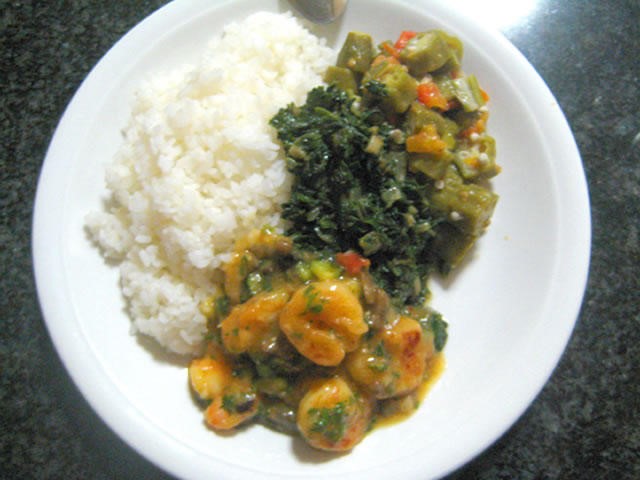
Dudu participated in the Asian Rural Institute training course in Tochigi Prefecture from April to December of last year. Here, she learned about organic farming and leadership. This involved a strict schedule of lectures and working on farms from the morning to night. There was even a cooking course that students from various countries in Asia and Africa performed together. Dudu probably came to realize the pleasure of cooking and sharing a meal through dining with other trainees.
To my surprise, she cooked Thai green curry for us to showcase her achievement. I was so grateful! When we decided to send her to the training course, we hadn’t expected such a change. My gratitude to the Asian Rural Institute has grown greatly because it gave us this change.
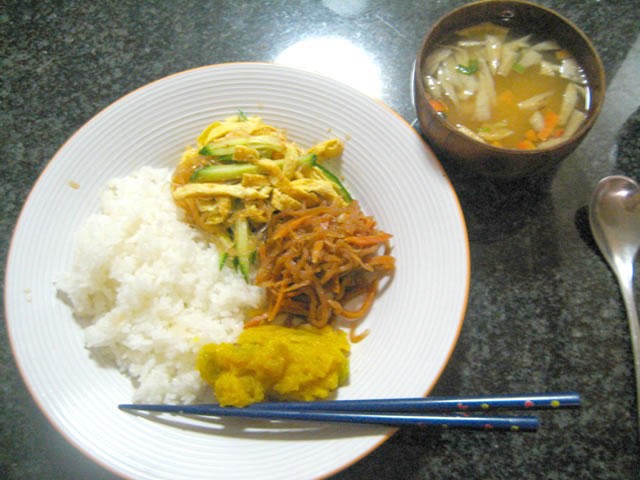
The first photo shows boiled rice, okras cooked into tomato sauce (Cameroonian style), stewed shrimp (Italian syle), and fried spinach. These meals were very delicious together! Dudu wanted to convey the pleasure of cooking and eating through her cooking. The second photo contains Japanese dishes that Dudu had cooked. This includes boiled rice, miso soup, dried strips of radish (kiriboshi-daikon in Japanese), food in sweetened vinegar with bean-starch vermicelli (harusame in Japanese), cucumber and shredded fried egg (kinshi-tamago in Japanese), and pumpkin salad. Those dishes were healthier than what I ate in Tokyo.
Importance of “Self-cooking”
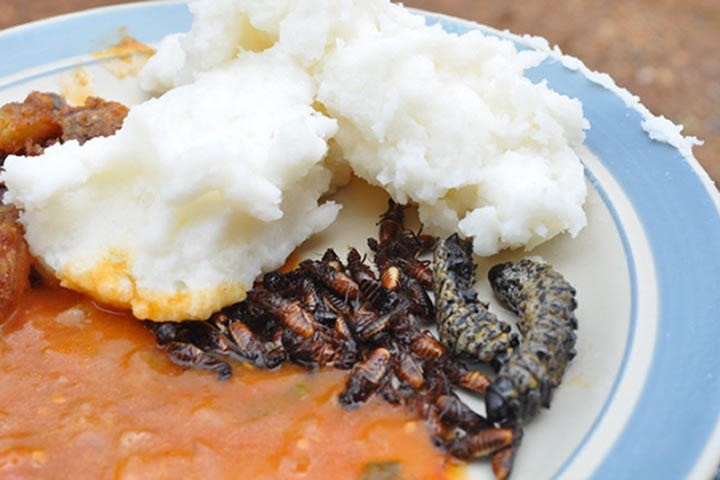
This photo shows Mopane worms and termites cooked in tomato sauce.
On the other hand, there was a “sadness” associated with food because food prices had raised drastically during the last year alone. This food is important to keep a well-balanced nutrition. However, in South Africa, where the unemployment rate is high, many people cannot afford it.
South Africa has had a lot of farmland destroyed during the apartheid. There’s hardly any farming, even in rural areas. Many people simply go to shops for buying food even at JVC’s project sites. I’m very worried about this. I went to buy food with Dudu and she screamed “Wow!” at the high prices. At this time, I came to realize that it’s important to cook by ourselves as much as possible.
Moses and Philip make basic food for themselves at home while they’re working for JVC. I asked them, “What do you really eat at home since there has been a drought?” They replied together as follows:
“We truly have had a poor harvest of maize, but we still managed to harvest a little. Butternuts, which are gourd-shaped vegetables like pumpkins, have grown richly due to the lack of rain. Cowpeas, which are beans, have been planted too. These are also edible. Delele, which is a wild vegetable like jute mallow (moroheiya), naturally grows in our gardens. It’s very delicious! Tomato is an essential food here, but it is difficult to buy. However, I have planted a few onions and tomatoes, which should be sufficient.”
In addition, they eat fruits and worms. This includes hairy caterpillars called Mopane worms, big ants, and grasshoppers. Mopane worms (on the right-side of the photo) and big ants called termites (in the center of the photo) might be served for lunch during a training session at this time of year. I enjoy eating them, but Dudu cannot since her home is in a different district from the JVC operating site.
The ability to make their own food is the most important factor for living a great life.
What is the objective of JVC’s local office in South Africa?
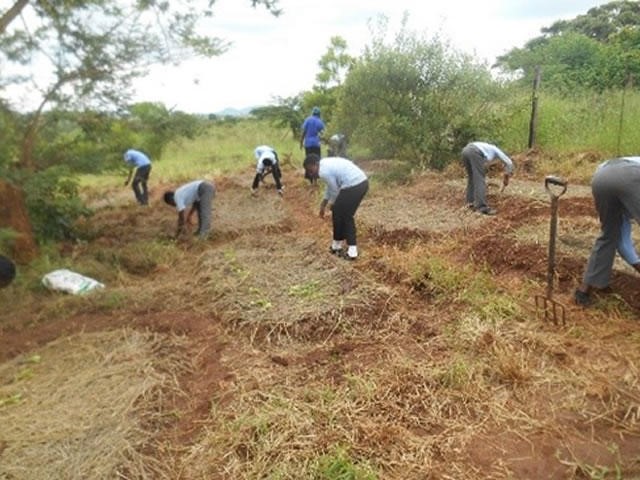
Children learning home vegetable gardening in a childcare center.
JVC’s local office in South Africa is now carrying out activities with teen youth, who have difficulties in their family situations like having lost their parents. We have seemingly obtained good results of our objectives up to the fiscal year of 2017. We think we would like to expand our experiences from our currently operating sites to other neighboring areas little by little in the fiscal year of 2018 and thereafter. We consider “the youth”, “food and farming”, and “self-production of food through home gardening” as keywords for that mission. Being able to independently support their daily lives through self-sustainability will enable them to survive in the future. Therefore, our local staff is strongly determined to convey its importance to the youth while they are young.
When new children start coming to the childcare center, they first learn about home gardening by best-utilizing the garden space. Thereafter, some children are going to have their own gardens. For example, Martin, has a splendid home garden, where he can harvest at any time because he plants food all year-round. Florence has become a trainer for gardening vegetables at home by conducting activities with JVC. She is meticulously taking care of those young people’s practices everyday.
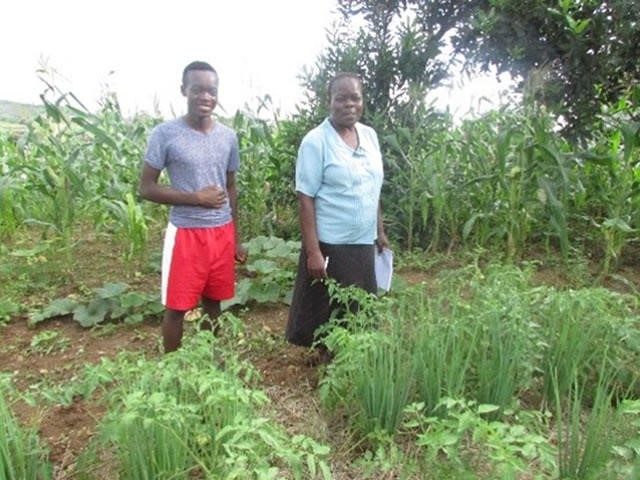
Martin on the left and Florence on the right.
It takes time to teach them the skills to produce food by utilizing their environment because they have no farming habits in rural areas in South Africa. However, we unexpectantly confirmed in our current activities that young people in their teens seem to enjoy practicing every day before taking part in their daily activities. We anticipate that it might not be easy, but we hope that the strong passion of Dudu, Moses, and Phillip will be conveyed to fellow South Africans.
Please don’t miss my next report!
Share This: